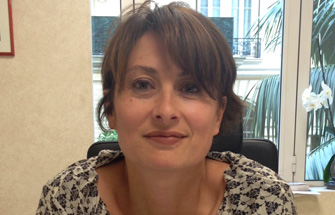Le 22 mars dernier, L’Association Monégasque des Activités Financières a reçu le Directeur du Travail, Madame Pascale PALLANCA, accompagnée de son Directeur adjoint , Mme Sophie Vincent, et de l’Inspecteur Principal du Travail, Mme Corinne VAN KLAVEREN. Nous avons interrogé Mme PALLANCA sur les missions de sa Direction.
Mrs Pallanca, Director of Employment, "Five of the ten Monegasque businesses with the highest payrolls are banks."
On 22 March, the Monegasque Association of Financial Activities received the Director of Employment, Mrs Pascale Pallanca, accompanied by her Deputy Director Mrs Sophie Vincent and Chief Labour Inspector Mrs Corinne Van Klaveren. We interviewed Mrs Pallanca about her Department’s duties.
This is the first time you and your team have visited AMAF. Is it important?
Absolutely. In parallel with the operational roles of the Department of Employment defined in particular by legislation, and in addition to the classical cross-functional duties relating to the management and coordination of its two sections, today we wish to be a real partner for our internal and external contacts in Monaco, on those matters within our jurisdiction.
Have you met your French counterparts then, and will you meet them in the future?
Yes, regular meetings are set up with the French equivalent of the Department of Employment (Dirrecte, Pôle Emploi etc.) and we have met some employers’ and employees’ unions, in order to enable each of these contacts to clearly pinpoint the Department of Employment’s role and duties and facilitate their making contact if need be. For us, it also keeps us close to the field and its issues, in order to help develop the regulatory framework and practices related to human resources management in businesses.
What are the Department of Employment’s duties?
We manage two separate sections: the Employment Office and the Labour Inspectorate. We liaise with the Department of Social Affairs and Health, our supervisory Department, and in contact with them we contribute to drafting legislation on labour law and its operational implementation. We also review the unions’ statutes. We examine the Hyperbaric Commission’s cases. We see to relations with the social partners. We chair the Joint Employment Commission (Commission Paritaire de l’Emploi). Finally, we participate in Monegasque, cross-border and international commissions on labour, unemployment, social security and labour law topics.
Coming back to the separate sections you mentioned, what exactly is the Employment Office responsible for?
It has five well-defined duties:
Verification of compliance with the legislation on conditions for recruitment and dismissal. Issue of work permits and authorisations to hire staff, ensuring previously through the Police Department, in compliance with the provisions of article 1-2 of Sovereign Ordinance 765 of 13 November 2006 as amended, that the job seekers are not likely to undermine public order. Management and placement of job seekers. Allocation and delivery of hiring subsidies, and management of the employment benefit scheme. Finally, production of statistical and analytical surveys of the labour market and future trends.
On that last point, can you give us some figures?
Financial and insurance activities accounted for 3782 jobs in 2015, a 4.48% increase on the previous year and a 30.46% increase in ten years. The banking sector has always continued to recruit, even in difficult years. Bancassurance accounts for 7.47% of employment in Monaco. Equality is fairly well respected, with 51% women and 49% men. Regulatory developments are creating new jobs in the compliance or conformity sector. Highly qualified employees are increasingly numerous and the required level is high.
Let’s come back to the second section, the Labour Inspectorate. What is its role?
It must ensure compliance with legal provisions relating to labour law as well as health and safety at work. It must also inform employers and employees on all matters relating to labour law and health and safety at work. Finally, and this is fundamental, it must prevent, mediate and arbitrate individual or group labour disputes.
How is it structured to fulfil all these duties?
It comprises labour inspectors and officers and there is also a special unit dedicated to health and safety at work.
The four Labour Inspectors, led by a Chief Inspector, deal with group cases: they receive employees, staff representatives and business representatives by appointment; they chair many commissions; they attend meetings of the Health and Safety Committee; within all industrial, commercial and workshop establishments they monitor implementation of legal and regulatory provisions on working conditions and workers’ protection in the areas of safety, hygiene and health. They inform employers and employees on the status of labour legislation and regulations and their implementing measures. They can issue penalties.
How do the Officers operate?
They deal with individual cases, and receive employees and employers during the public opening times, without appointments. Within all industrial, commercial and workshop establishments they monitor implementation of legal and regulatory provisions on labour law. Finally, they inform employers and employees on the status of labour legislation and regulations and their implementing measures.
Does the Health and Safety Unit comprise specialists?
Yes, of course. It comprises a manager and a health and safety officer. They process building permits and applications for business set ups and building sites. And within all industrial, commercial and workshop establishments, and on building sites, they monitor implementation of legal and regulatory provisions on working conditions and workers’ protection in the areas of safety, hygiene and health.
And to conclude?
There are six banks are in the top 40 Monegasque businesses by headcount, and eleven banks in the top 40 businesses by payroll, five of which are in the top 10. This means that five of the ten Monegasque businesses with the highest payroll are banks. It shows the sector’s importance for Monaco. That said, it is also a very rapidly evolving sector and it is important that the different players be clearly identified.






